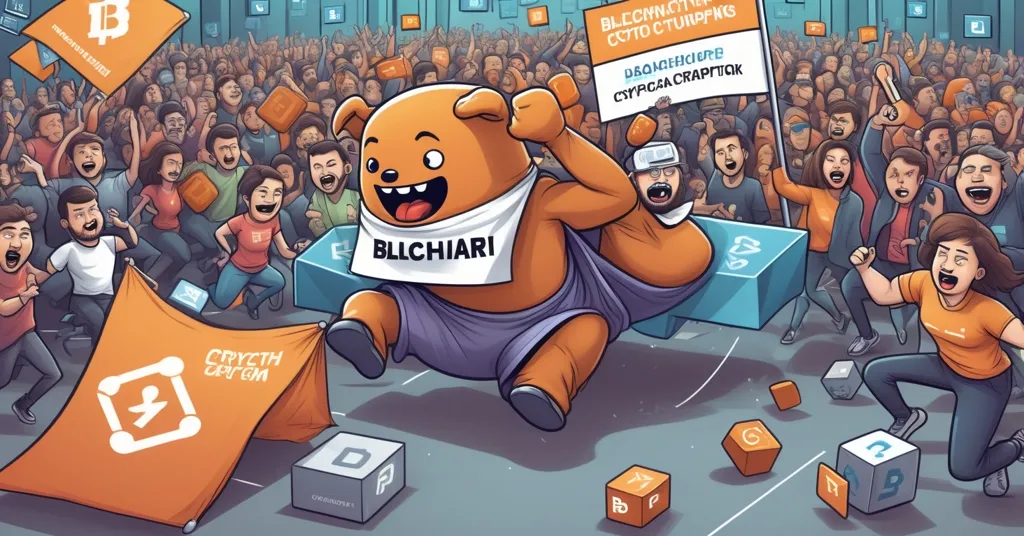Solana Ad on Gender Identity Backfires, Sparks Crypto Community Outrage

Solana’s Misstep: Controversial Ad on Gender Identity Sparks Backlash
Solana, a leading blockchain platform renowned for its speed and efficiency, recently found itself in a storm of controversy over an advertisement meant to champion inclusivity but instead ignited widespread criticism.
- Solana ad aimed at inclusivity sparks controversy.
- Backlash from crypto community and public over gender identity focus.
- Debate on blockchain companies’ marketing responsibilities.
The Controversial Ad
Picture this: You’re scrolling through your feed when you stumble upon a new ad from Solana, titled “America is Back—Time to Accelerate.” It’s meant to blend American patriotism with tech innovation, but it unintentionally brings up topics about gender identity. The ad quickly racks up 1.2 million views and 1,300 comments, only to be pulled down a mere nine hours later due to intense backlash. A blockchain platform, in simple terms, is a type of technology that records transactions securely and transparently, much like a digital ledger that can’t be tampered with.
Industry Reaction
The crypto community and the general public didn’t hold back. The ad was slammed for being tone-deaf and inappropriate. Industry insiders like Tyler Bench and Anneri van der Merwe voiced their disapproval, emphasizing that the ad clashed with the crypto space’s core values of inclusivity and diversity. Adam Cochran pointed out the significant contributions of transgender and non-binary individuals to open-source software—software whose source code is publicly available, allowing anyone to view, use, or modify it—and cryptography, stressing the need for sensitivity in such matters.
“The ad was intended to promote inclusivity but instead came off as tone-deaf and inappropriate.”
Solana’s Response
Solana’s CEO, Anatoly Yakovenko, was quick to admit the ad’s insensitivity and promised a focus on tech, not cultural battles. He expressed regret and shame over the ad’s impact on marginalized groups. To turn things around, Yakovenko pledged to steer Solana towards open-source software development and decentralization, steering clear of cultural wars. This move aligns with the ethos of challenging the status quo and fostering decentralization, core tenets of the crypto world.
Lessons Learned
This incident has sparked a broader discussion about the responsibilities of blockchain companies in their marketing efforts. As the blockchain and cryptocurrency sectors increasingly engage with social issues to appeal to a diverse audience, this case serves as a stark reminder of the challenges involved in navigating complex societal topics. Historically, the crypto space has been criticized for its lack of diversity and inclusivity, prompting efforts like Solana’s to address these issues. However, crafting messages that are not only well-intentioned but also well-received by their intended audience remains a significant hurdle.
The power of social media in shaping public sentiment was evident in the rapid spread of negative feedback on platforms like X (formerly Twitter). This underscores the urgency for companies to respond swiftly and thoughtfully to controversies. While blockchain technology offers potential benefits for marketing, such as increased transparency and security, as seen in initiatives like Babyghost’s collaboration with VeChain and NYIAX’s ad contract marketplace, Solana’s ad failed to leverage these advantages and instead became a cautionary tale.
The Role of Technology
Blockchain technology can revolutionize marketing by enhancing transparency and security. For instance, Babyghost’s collaboration with VeChain demonstrates how blockchain can ensure the authenticity of products through supply chain management. Similarly, NYIAX’s ad contract marketplace uses blockchain to streamline and secure advertising transactions. These examples highlight the potential of blockchain in marketing, contrasting sharply with Solana’s misstep.
Bitcoin Maximalist Viewpoint
From a Bitcoin maximalist perspective, Solana’s incident underscores the importance of focusing on the core mission of decentralization and financial freedom rather than diving into cultural debates. Bitcoin purists might argue that altcoins like Solana often stray too far from the original ethos of cryptocurrency, which is to challenge the financial status quo, not engage in social marketing campaigns. While altcoins and other blockchain platforms have their roles in the ecosystem, Bitcoin remains the gold standard for those who champion decentralization and the principles of effective accelerationism (e/acc).
Key Questions and Takeaways
- What was the intended message of Solana’s advertisement?
Solana intended to promote inclusivity, focusing on gender identity issues.
- Why did the advertisement receive backlash?
The advertisement was perceived as tone-deaf and inappropriate, leading to criticism from both the crypto community and the general public.
- What broader discussion has this incident sparked within the blockchain industry?
It has sparked a discussion about the responsibilities of blockchain companies in their marketing efforts and the potential impact on their brand and community.
- How should blockchain companies approach sensitive social issues in their marketing?
Companies need to be more mindful and sensitive to social issues, ensuring their messages are well-received and do not alienate their audience. This can be informed by studies on inclusivity in cryptocurrency marketing.
Stay informed about the latest trends and controversies in the blockchain and cryptocurrency space by subscribing to the “Let’s Talk, Bitcoin” newsletter.



